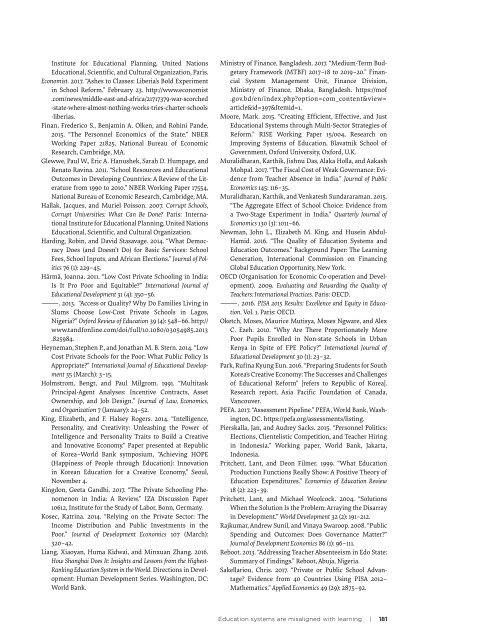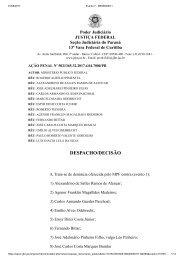Brasil só deve dominar Leitura em 260 anos, aponta estudo do Banco Mundial Relatorio Banco Mundial _Learning
You also want an ePaper? Increase the reach of your titles
YUMPU automatically turns print PDFs into web optimized ePapers that Google loves.
Institute for Educational Planning, United Nations<br />
Educational, Scientific, and Cultural Organization, Paris.<br />
Economist. 2017. “Ashes to Classes: Liberia’s Bold Experiment<br />
in School Reform.” February 23. http://www.economist<br />
.com/news/middle-east-and-africa/21717379-war-scorched<br />
-state-where-almost-nothing-works-tries-charter-schools<br />
-liberias.<br />
Finan, Frederico S., Benjamin A. Olken, and Rohini Pande.<br />
2015. “The Personnel Economics of the State.” NBER<br />
Working Paper 21825, National Bureau of Economic<br />
Research, Cambridge, MA.<br />
Glewwe, Paul W., Eric A. Hanushek, Sarah D. Humpage, and<br />
Renato Ravina. 2011. “School Resources and Educational<br />
Outcomes in Developing Countries: A Review of the Literature<br />
from 1990 to 2010.” NBER Working Paper 17554,<br />
National Bureau of Economic Research, Cambridge, MA.<br />
Hallak, Jacques, and Muriel Poisson. 2007. Corrupt Schools,<br />
Corrupt Universities: What Can Be Done? Paris: International<br />
Institute for Educational Planning, United Nations<br />
Educational, Scientific, and Cultural Organization.<br />
Harding, Robin, and David Stasavage. 2014. “What D<strong>em</strong>ocracy<br />
Does (and Doesn’t Do) for Basic Services: School<br />
Fees, School Inputs, and African Elections.” Journal of Politics<br />
76 (1): 229–45.<br />
Härmä, Joanna. 2011. “Low Cost Private Schooling in India:<br />
Is It Pro Poor and Equitable?” International Journal of<br />
Educational Development 31 (4): 350–56.<br />
————. 2013. “Access or Quality? Why Do Families Living in<br />
Slums Choose Low-Cost Private Schools in Lagos,<br />
Nigeria?” Oxford Review of Education 39 (4): 548–66. http://<br />
www.tandfonline.com/<strong>do</strong>i/full/10.1080/03054985.2013<br />
.825984.<br />
Heyn<strong>em</strong>an, Stephen P., and Jonathan M. B. Stern. 2014. “Low<br />
Cost Private Schools for the Poor: What Public Policy Is<br />
Appropriate?” International Journal of Educational Development<br />
35 (March): 3–15.<br />
Holmstrom, Bengt, and Paul Milgrom. 1991. “Multitask<br />
Principal-Agent Analyses: Incentive Contracts, Asset<br />
Ownership, and Job Design.” Journal of Law, Economics,<br />
and Organization 7 (January): 24–52.<br />
King, Elizabeth, and F. Halsey Rogers. 2014. “Intelligence,<br />
Personality, and Creativity: Unleashing the Power of<br />
Intelligence and Personality Traits to Build a Creative<br />
and Innovative Economy.” Paper presented at Republic<br />
of Korea–World Bank symposium, “Achieving HOPE<br />
(Happiness of People through Education): Innovation<br />
in Korean Education for a Creative Economy,” Seoul,<br />
Nov<strong>em</strong>ber 4.<br />
King<strong>do</strong>n, Geeta Gandhi. 2017. “The Private Schooling Phenomenon<br />
in India: A Review.” IZA Discussion Paper<br />
10612, Institute for the Study of Labor, Bonn, Germany.<br />
Kosec, Katrina. 2014. “Relying on the Private Sector: The<br />
Income Distribution and Public Investments in the<br />
Poor.” Journal of Development Economics 107 (March):<br />
320–42.<br />
Liang, Xiaoyan, Huma Kidwai, and Minxuan Zhang. 2016.<br />
How Shanghai Does It: Insights and Lessons from the Highest-<br />
Ranking Education Syst<strong>em</strong> in the World. Directions in Development:<br />
Human Development Series. Washington, DC:<br />
World Bank.<br />
Ministry of Finance, Bangladesh. 2017. “Medium-Term Budgetary<br />
Framework (MTBF) 2017–18 to 2019–20.” Financial<br />
Syst<strong>em</strong> Manag<strong>em</strong>ent Unit, Finance Division,<br />
Ministry of Finance, Dhaka, Bangladesh. https://mof<br />
.gov.bd/en/index.php?option=com_content&view=<br />
article&id=397&It<strong>em</strong>id=1.<br />
Moore, Mark. 2015. “Creating Efficient, Effective, and Just<br />
Educational Syst<strong>em</strong>s through Multi-Sector Strategies of<br />
Reform.” RISE Working Paper 15/004, Research on<br />
Improving Syst<strong>em</strong>s of Education, Blavatnik School of<br />
Government, Oxford University, Oxford, U.K.<br />
Muralidharan, Karthik, Jishnu Das, Alaka Holla, and Aakash<br />
Mohpal. 2017. “The Fiscal Cost of Weak Governance: Evidence<br />
from Teacher Absence in India.” Journal of Public<br />
Economics 145: 116–35.<br />
Muralidharan, Karthik, and Venkatesh Sundararaman. 2015.<br />
“The Aggregate Effect of School Choice: Evidence from<br />
a Two-Stage Experiment in India.” Quarterly Journal of<br />
Economics 130 (3): 1011–66.<br />
Newman, John L., Elizabeth M. King, and Husein Abdul-<br />
Hamid. 2016. “The Quality of Education Syst<strong>em</strong>s and<br />
Education Outcomes.” Background Paper: The <strong>Learning</strong><br />
Generation, International Commission on Financing<br />
Global Education Opportunity, New York.<br />
OECD (Organisation for Economic Co-operation and Development).<br />
2009. Evaluating and Rewarding the Quality of<br />
Teachers: International Practices. Paris: OECD.<br />
————. 2016. PISA 2015 Results: Excellence and Equity in Education.<br />
Vol. 1. Paris: OECD.<br />
Oketch, Moses, Maurice Mutisya, Moses Ngware, and Alex<br />
C. Ezeh. 2010. “Why Are There Proportionately More<br />
Poor Pupils Enrolled in Non-state Schools in Urban<br />
Kenya in Spite of FPE Policy?” International Journal of<br />
Educational Development 30 (1): 23–32.<br />
Park, Rufina Kyung Eun. 2016. “Preparing Students for South<br />
Korea’s Creative Economy: The Successes and Challenges<br />
of Educational Reform” [refers to Republic of Korea].<br />
Research report, Asia Pacific Foundation of Canada,<br />
Vancouver.<br />
PEFA. 2017. “Assessment Pipeline.” PEFA, World Bank, Washington,<br />
DC. https://pefa.org/assessments/listing.<br />
Pierskalla, Jan, and Audrey Sacks. 2015. “Personnel Politics:<br />
Elections, Clientelistic Competition, and Teacher Hiring<br />
in In<strong>do</strong>nesia.” Working paper, World Bank, Jakarta,<br />
In<strong>do</strong>nesia.<br />
Pritchett, Lant, and Deon Filmer. 1999. “What Education<br />
Production Functions Really Show: A Positive Theory of<br />
Education Expenditures.” Economics of Education Review<br />
18 (2): 223–39.<br />
Pritchett, Lant, and Michael Woolcock. 2004. “Solutions<br />
When the Solution Is the Probl<strong>em</strong>: Arraying the Disarray<br />
in Development.” World Development 32 (2): 191–212.<br />
Rajkumar, Andrew Sunil, and Vinaya Swaroop. 2008. “Public<br />
Spending and Outcomes: Does Governance Matter?”<br />
Journal of Development Economics 86 (1): 96–111.<br />
Reboot. 2013. “Addressing Teacher Absenteeism in E<strong>do</strong> State:<br />
Summary of Findings.” Reboot, Abuja, Nigeria.<br />
Sakellariou, Chris. 2017. “Private or Public School Advantage?<br />
Evidence from 40 Countries Using PISA 2012–<br />
Math<strong>em</strong>atics.” Applied Economics 49 (29): 2875–92.<br />
Education syst<strong>em</strong>s are misaligned with learning | 181








